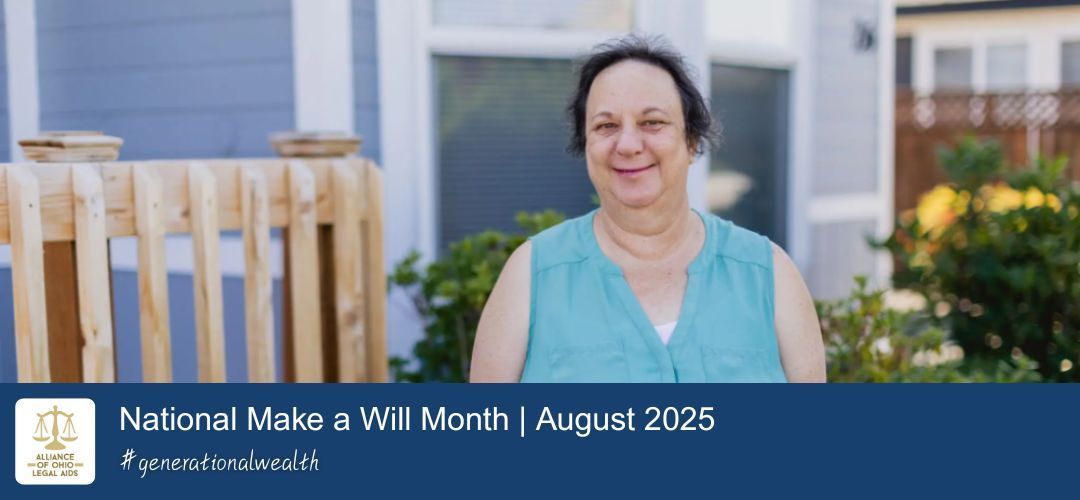Wills and Estate Plans Not Just for the Wealthy
How legal aid helps low-income seniors plan for their family’s future

When Howard Rabb, a former private practice attorney who specialized in estate planning and bankruptcy, tells people he is now a contract attorney for The Legal Aid Society of Cleveland, they assume he is doing bankruptcy work.
He’s not. Rabb works for Legal Aid’s Economic Justice Group, helping low-income clients hold on to their wealth and pass it to the next generation.
Lack of estate planning impacts people with lower income and wealth
It’s a common misconception that people with low income or wealth have little need for a will. An estimated 67% of Americans don’t have estate plans, primarily because they believe they are not old enough or wealthy enough to need one. Some populations are even less likely to have an estate plan. While 55% of American households making over $75,000 per year have a will, only 31% of those making under $30,000 do. And while approximately 40% of white people have a will, only 28% of Black and 18% of Latinx people have one.
“I get the question all of the time,” Rabb said. “’You do estate planning for Legal Aid? Explain that to me.'”
Rabb explains it like this. “The people I meet with, their primary asset is their home. So most of their net worth is wrapped up in their house. From an estate planning perspective, it’s fairly simple to figure out how to make sure that asset ends up in the right person’s hands.”
But without an estate plan, inheriting a house gets complicated, especially for people with less means.
Rabb tells a common narrative. “Grandma had a house. Twenty years after her death, her grandson is still living in the house, but he isn’t on the deed.”
Without his name on the deed, the grandson can’t remortgage the house or negotiate changes with the lender. He can’t apply for heating assistance or other grants available to low-income homeowners. If he gets behind on utilities and goes into default, he can't find out what’s going on with his account or how to remediate.
“It creates all sorts of problems if you don’t know what’s going on with your home because you’re not allowed to ask,” Rabb said.
What is an estate?
For many people, the word “estate” connotes wealth, but Denise Zanni, Senior Attorney at Legal Aid of Western Ohio (LAWO) explains otherwise.
“An estate is your car,” Zanni said. “An estate is your house or mobile home. An estate is your bank account no matter how much is in it.”
Zanni, who works exclusively with clients over 60, said that while some clients seek out her estate planning services, LAWO recognizes that many potential clients do not know they have the need. So the first step has to be education.
Zanni and her colleagues offer their Plan Ahead and Protect Yourself series at senior centers, Area Agency on Aging offices, and other community locations throughout their 32-county service area with topics like wills and estate planning, financial powers of attorney, healthcare powers of attorney, protecting assets, and recognizing scams. Depending on the topic, the Legal Aid attorneys offer a legal clinic immediately following the session or – for topics that require more in depth assistance – invite participants to make a follow up appointment.
Participants in the Plan Ahead series often report they were not aware of transfer on death affidavits and other methods for ensuring your home, car, and bank account transfer to the person of your choosing without a costly and time-consuming probate court case.
“We have to do what we can with the resources we have,” Zanni said, noting that limited Legal Aid funds make it challenging to commit attorney time to lengthy probate cases. “We really put an emphasis on education and advanced planning, so hopefully fewer people end up in probate.”
If you had to sign to get it, you have to sign to give it away
Miranda Anandappa, Senior Attorney with Legal Aid of Southeast and Central Ohio, explained why everyone can benefit from an estate planning conversation with a lawyer.
“Because people don’t have a lot of money or a lot to their name, they think it’s going to be straight forward and everything will just go to their kids,” Anandappa said.
But it’s not that simple.
“You can think of it this way, if you had to sign paperwork to put your name on it - such as a deed, car title, or life insurance policy - then you're going to have to sign paperwork to make sure it transfers into someone else's name in the future.”
And there are other considerations.
Anandappa told the story of a client who was concerned about the welfare of their adult child with disabilities and planned to leave their house to their child upon their death. Anandappa explained to her clients that inheriting an asset of that amount – even if it’s a house with a relatively low value - would put the inheritor at risk of losing access to SSI and Medicaid.
“Someone who can’t do activities of daily living can’t afford to lose their Medicaid,” Anandappa explained. She advised the parents to create a trust that would allow their child to benefit from the asset without endangering critical services.
"The parents were very relieved,” Anandappa said, “because they wanted to leave their kid in a good position.” Meeting with a Legal Aid attorney prevented them from doing the opposite.
Contact the legal aid organization in your region to learn more about will and estate planning services for Ohioans age 60+ with low incomes.
Thank you to Leah Markovich, Development and Communications Senior Manager at The Legal Aid Society of Cleveland, for her contributions to this article.
